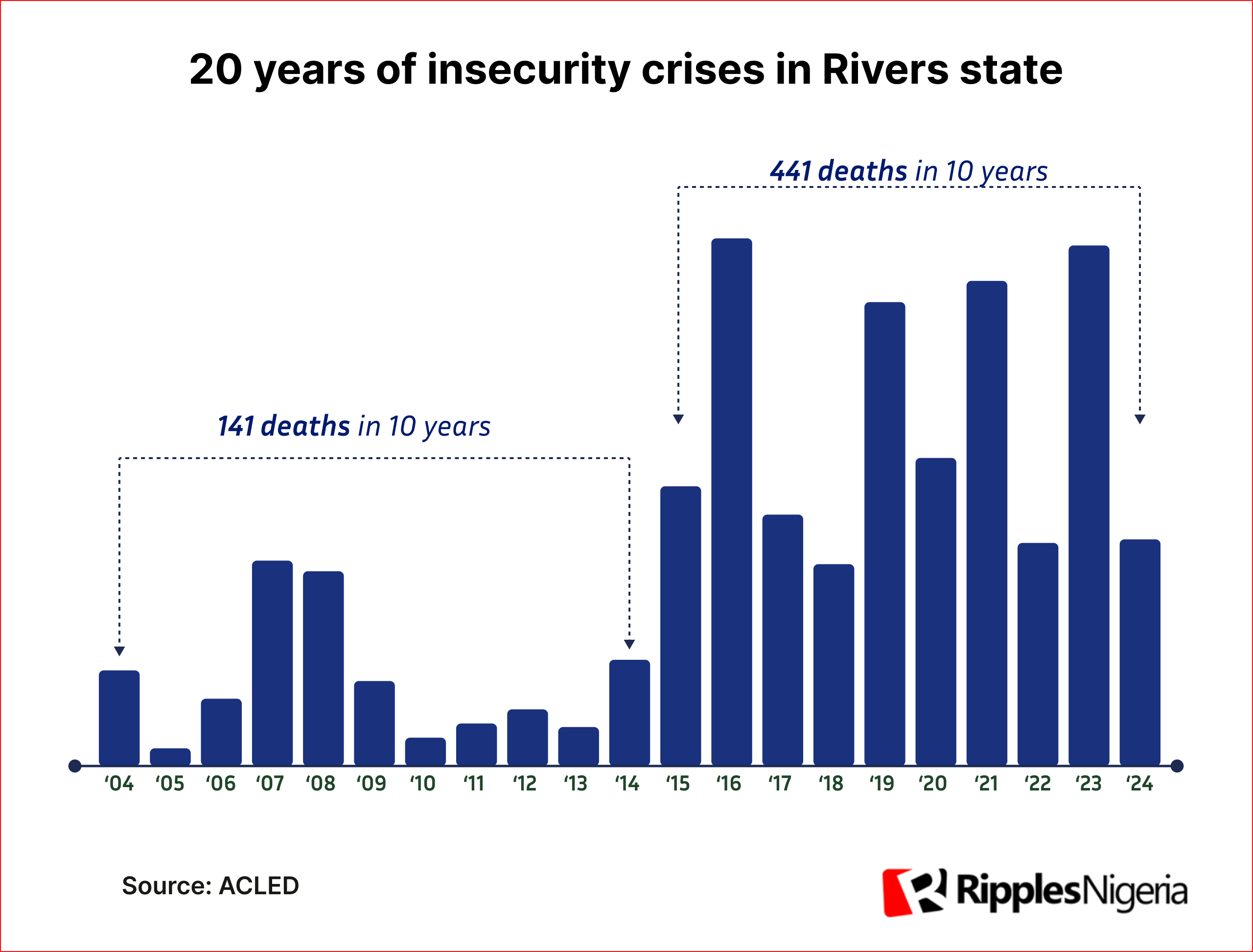Ripples Metrics
RipplesMetrics: 1,250 people killed in 20 years of crisis in Rivers State (Part 1)

Since Siminalayi Fubara took office as the governor of Rivers State in May 2023, his administration has faced significant political tensions, many of which stem from ongoing disagreements between him and his predecessor, Ezenwo Wike. Wike, who is now the Minister of the Federal Capital Territory, has been at the heart of several disputes that have disrupted the smooth functioning of the government of that state.
These tensions have caused a deep divide between the executive and legislative branches, with both sides splitting into opposing factions. Recently, the situation has escalated, culminating in President Bola Tinubu declaring a State of Emergency. In response to the growing crisis, Tinubu also appointed a sole administrator, retired Vice Admiral Ibok-Ete Ibas, a former Chief of Naval Staff and the recent High Commissioner to Ghana, to oversee the administration of the state.
This series by RipplesMetrics looks into several socio-economic data of Rivers State to show the trend around issues which have stirred controversies over time.
The Escalating Insecurity in Rivers State
Rivers State, nestled in the oil-rich Niger Delta of Nigeria, is a region of stark contrasts. Known for its abundant natural resources and cultural vibrancy, the state also grapples with an unsettling narrative of insecurity. An analysis of data from Armed Conflict Location & Event Data between 2004 to 2024 paints a grim picture of increasing violence, targeting civilians and leading to numerous fatalities.
The tale of insecurity in Rivers State begins in 2004, a year marking the onset of recorded civilian targeting incidents. With nine such incidents, resulting in 27 fatalities, the pattern set a worrying precedent. The following year, 2005, surprisingly saw a decrease, with only four incidents and five fatalities. Yet, this brief respite was not to last.
READ ALSO: Lagos govt warns commercial bus operators against route violations, illegal parking
In 2006, incidents surged to 14, resulting in 19 deaths, foreshadowing the dire escalation of violence. The peak came in 2007, with a stark increase to 38 incidents and 58 fatalities. This upward trajectory highlights a growing crisis, one deeply rooted in socio-economic and political complexities.
Within the 20 years, a total of 1250 fatalities have been reported in the state with over 500 of the record deaths targeted at civilians. The years with the highest record of deaths were 2016, 2019, 2021 and 2023 where the death rate surpassed over 100 fatalities.
Although this death record is low compared to what some Northern states report in a year, the data showed that most of the fatalities reported are tied to initiated political violence or demonstrations. Local government areas with the highest record of killings within the last 24 years are Emohua (101 deaths), Obio (101 deaths), Ogba (101 deaths), and Port Harcourt (299 deaths).
At the heart of Rivers State’s insecurity lies the paradox of oil wealth. While the oil industry is a cornerstone of Nigeria’s economy, it has also been a source of conflict. Disputes over resource control and environmental degradation have fuelled tensions between local communities, oil corporations, and the government. This has been compounded by socio-economic disparities and perceptions of marginalization, creating a fertile ground for unrest.
Moreover, the emergence of armed groups and militias has exacerbated the situation. These groups, often driven by grievances over resource allocation and political disenfranchisement, have resorted to violence to assert their demands. This has further entangled the delicate web of insecurity in Rivers State.
By: James Odunayo
Join the conversation
Support Ripples Nigeria, hold up solutions journalism
Balanced, fearless journalism driven by data comes at huge financial costs.
As a media platform, we hold leadership accountable and will not trade the right to press freedom and free speech for a piece of cake.
If you like what we do, and are ready to uphold solutions journalism, kindly donate to the Ripples Nigeria cause.
Your support would help to ensure that citizens and institutions continue to have free access to credible and reliable information for societal development.




























